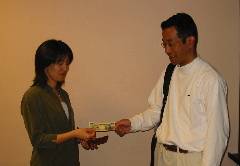 |
|||||||
|
|||||||
Exercise 7: Simulation Exercises for Making a Request
Read the situation below and complete the dialogue as if you were actually carrying on a real conversation with the other person. Type into each box in the sequence what you would most likely say at that point in the interaction. Later you will be asked to reflect on your language use.
Situation You are a college student. You belong to a music club, and now you are just about to enter a music concert hall with a clubmate of yours, Keiko, who is two years younger than you (kouhai). Just before buying a ticket, you realize that you are a bit short of money. Since you are a good friend of this kouhai, you decide to ask if you can borrow 1000 yen (about US$8) from her.
|
|||||||
Center for Advanced Research on Language Acquisition (CARLA) • 140 University International Center •
331 17th Ave SE • Minneapolis, MN 55414 | Contact CARLA
